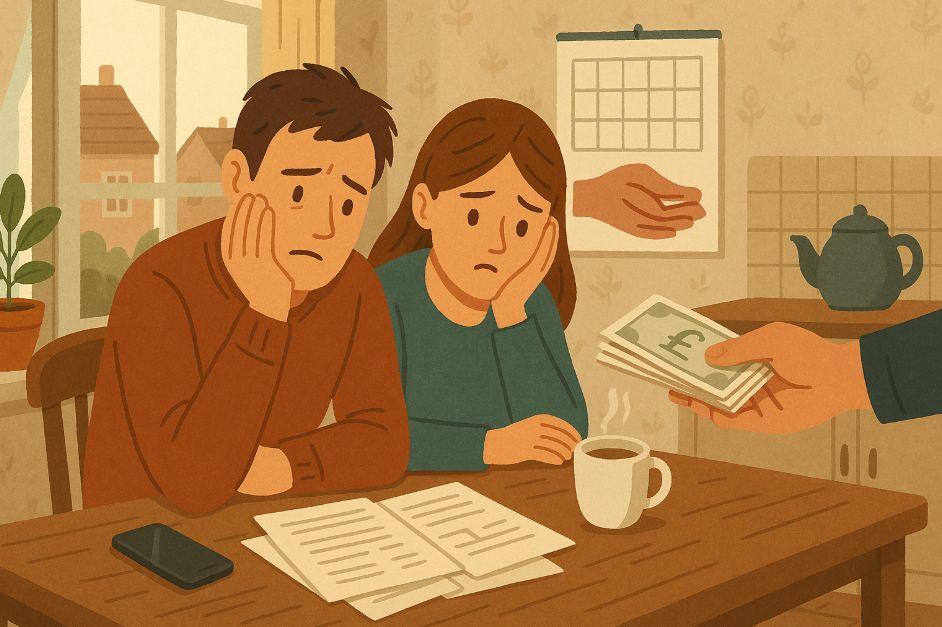Many applicants face financial difficulty during the typical five-week wait for their first Universal Credit payment, making it hard to meet urgent costs like rent and food.To ease this period, the Department for Work and Pensions (DWP) offers an advance payment a short-term loan deducted from future benefits.
In 2025, knowing the maximum amount you can get, how to apply, and what repayment involves is essential, especially for claimants in London. This guide explains the key facts about the Universal Credit advance payment maximum to help you make informed decisions.
What Are Universal Credit Advance Payments and Why Do They Matter?

The Role of Universal Credit Advances
Universal Credit is a lifeline for millions of people in the UK, especially those transitioning between jobs, struggling with low income, or newly unemployed. However, the five-week wait before receiving the first payment often puts claimants in a difficult financial position.
To address this, the Department for Work and Pensions(DWP) offers an advance payment, allowing individuals to access funds early.
This advance is a repayable loan against your future Universal Credit entitlement. Although it is not additional income, it serves as a much-needed bridge for those who cannot manage essential expenses during the waiting period.
Circumstances That Warrant an Advance
People apply for an advance for various reasons, such as covering rent, buying food, paying utility bills, or meeting other urgent needs. Those without any other income or savings are most likely to qualify for the maximum advance offered in 2025.
When and How Can You Apply for an Advance?
You can apply for an advance as soon as you submit a Universal Credit claim. The request must be made within the first month of your initial application. Approval can take place within days or even hours in urgent cases.
How Much Universal Credit Advance Can You Get in 2025?
In 2025, the maximum Universal Credit advance payment a person can receive is up to 100% of their estimated monthly benefit entitlement. The exact amount is determined by your personal circumstances, including housing needs, dependents, and whether you are single or part of a couple.
For example, a single adult over 25 might receive an advance of up to £368.74, while a couple with children may qualify for significantly more depending on their complete award calculation.
The DWP uses the same criteria for advance calculation as it does for Universal Credit itself. These include:
- Age and household composition
- Housing costs (rent or mortgage contributions)
- Number of children or dependents
- Any disabilities or health conditions
- Employment income, if applicable
The department may offer less than the full amount requested if they believe it could cause repayment difficulties or if the claimant already owes money to the DWP.
Advance Limits Based on Household Type
| Household Category | Monthly Entitlement Estimate | Maximum Advance (100%) |
| Single claimant under 25 | £292.11 | £292.11 |
| Single claimant aged 25+ | £368.74 | £368.74 |
| Couple (both under 25) | £458.51 | £458.51 |
| Couple (one or both over 25) | £578.82 | £578.82 |
| Couple with 1 child | £726.37+ | Based on full entitlement |
| Couple with 2 or more children | £909.19+ | Based on full entitlement |
These are base figures. The final advance calculation will also account for housing, disability, and childcare elements.
Who Is Eligible for a Universal Credit Advance?
To be eligible for an advance in 2025, the following criteria must be met:
- The applicant must have made a new claim for Universal Credit.
- They must demonstrate financial hardship.
- The identity verification process must be completed.
- The applicant must agree to repay the loan within a set timeframe.
Those who have already received an advance within the past year may have limited eligibility, especially if repayment is still in progress.
Special Considerations for Vulnerable Applicants
Certain groups, such as single parents, people with disabilities, or those fleeing domestic violence, may receive additional support. These applicants may be considered for higher advances or more flexible repayment schedules based on their vulnerability and need.
How Do You Apply for a Universal Credit Advance?

Step-by-Step Application Process
To apply for an advance, claimants can use the online Universal Credit account or call the Universal Credit helpline. Here’s how the process typically unfolds:
- Log in to your Universal Credit online account.
- Go to your journal and click on “Apply for an Advance.”
- Enter the reason for the request and the amount needed.
- Confirm your agreement to repay the amount through deductions.
- Wait for a decision from the DWP, which may follow up via message or call.
Online Versus Phone Applications
Online applications are quicker and preferred by most claimants. Phone applications are available for those who have difficulties using digital platforms, although they may involve more identity verification steps.
Required Documentation and Information
Applicants should be prepared with the following:
- Bank account details for receiving the advance
- National Insurance number
- Estimated household expenses
- Details of any previous DWP debts
What Are the Repayment Terms for a Universal Credit Advance?
How Long Do You Have to Repay?
As of 2025, the repayment period for a Universal Credit advance can be up to 24 months. Deductions begin from the first monthly Universal Credit payment and continue until the loan is paid off.
Understanding the Deduction Amounts
The DWP deducts between 10% and 25% of your Universal Credit monthly payment until the balance is cleared. This percentage depends on the amount borrowed and your current financial situation.
Example Repayment Scenarios
| Advance Taken | Repayment Period | Monthly Deduction |
| £300 | 12 months | £25.00 |
| £400 | 18 months | £22.22 |
| £500 | 24 months | £20.83 |
These figures can change if the DWP adjusts your Universal Credit entitlement during the repayment period.
Can Repayments Be Delayed or Adjusted?
Yes. If you’re facing serious financial difficulty, you may request a pause or reduction in repayments. This request must be made through your online journal or by contacting your work coach. Approval is not guaranteed and is assessed on a case-by-case basis.
What Other Financial Support Is Available If the Advance Is Not Enough?
Budgeting Advances for Ongoing Needs
Claimants who have been receiving Universal Credit for more than six months may qualify for a Budgeting Advance to help with one-off or unexpected costs. This is different from the initial advance and is meant to cover one-off expenses like furniture, job-related travel, or emergency costs.
The amount varies between £100 and £812, depending on your circumstances. Like the initial advance, it is repayable through deductions from your monthly Universal Credit payments.
Support from Local Authorities in London
London borough councils often offer Local Welfare Assistance Schemes that provide emergency food vouchers, utility support, and rent deposit help. These programs differ by council, and eligibility depends on income and vulnerability status.
Community and Charity Support Options
Organisations like Turn2Us, Trussell Trust, and StepChange offer financial advice, hardship grants, or access to food banks. These can serve as valuable alternatives when official support isn’t enough.
How Can Claimants Manage Finances While Waiting for Their First Payment?

Budgeting for the Five-Week Wait
The five-week wait can be financially challenging. Using digital budgeting tools such as MoneyHelper or free planners from StepChange can help manage essentials during this time. Focusing on essential expenses such as housing, utilities, and groceries can reduce the risk of falling into debt while waiting for benefit payments.
Seeking Help Before a Financial Crisis
Early communication with your landlord, energy provider, or council tax office can help prevent penalties. Many providers offer payment plans or grant schemes for people waiting for benefits.
Avoiding High-Interest Loans
While payday loans may appear to solve immediate cash flow problems, they often lead to long-term debt. Claimants are advised to seek regulated financial support and avoid high-interest lending wherever possible.
What Should You Know Before Accepting a Universal Credit Advance in 2025?
Weighing Short-Term Help Against Long-Term Deductions
An advance can offer vital relief during a tough period, but it’s important to remember that it reduces future Universal Credit payments. Taking the full amount could impact your ability to manage ongoing expenses.
Exploring All Options First
Before applying for the advance, consider:
- Whether friends or family can help short-term
- Local councils may provide faster or non-repayable emergency assistance, which can be a better option than an advance in some situations.
- Applying for multiple types of support (advance, budgeting, or council schemes)
Being informed helps you avoid over-borrowing and future financial strain.
Can You Be Refused a Universal Credit Advance Payment?
Reasons for a Denied Advance Request
While the advance payment is designed to support claimants in urgent need, not every application is approved. The Department for Work and Pensions (DWP) can refuse an advance based on several criteria.
One of the most common reasons is a lack of financial need. If you have access to other income or savings, or if your current circumstances don’t demonstrate hardship, your application may be declined.
Another reason could be outstanding debts to the DWP. If you’ve previously received an advance or a budgeting loan and haven’t repaid it, the department might restrict how much more you can borrow or deny a new advance altogether.
Failure to pass identity verification is also a frequent reason for rejection. If the system can’t confirm who you are, or if there’s incomplete information in your Universal Credit journal, the request might not move forward.
What You Can Do If Refused?
If your advance is denied, you can:
- Request a reconsideration through your Universal Credit journal
- Speak with your work coach for more information
- Explore alternative support like Local Welfare Assistance schemes or budgeting advances (if eligible)
By identifying why an advance was refused, applicants can take corrective steps and improve their chances of approval in a future request.
How Does the Universal Credit Advance Work in Emergency Situations?

Immediate Needs and Same-Day Payments
In some extreme cases, Universal Credit advance payments can be processed on the same day, especially if you’re at risk of homelessness, going without food, or losing access to electricity or heating. The DWP treats these as emergency situations, and they may prioritise your case for a faster response.
To apply under emergency circumstances, you’ll need to make this clear in your journal or during a phone call with a Universal Credit representative. Supporting evidence, such as eviction notices, overdue energy bills, or a letter from a GP or charity, may speed up the process.
Emergency vs Standard Advance Applications
While standard advance requests may take up to three working days, emergency requests are dealt with more urgently. However, the repayment obligations remain the same, even if the payment was issued quicker.
It’s important not to rely solely on the DWP for emergencies. If you’re in London, there are multiple charities, food banks, and local authority schemes that can offer same-day support alongside or instead of an advance.
Conclusion
In 2025, eligible individuals can access up to the full value of their estimated Universal Credit entitlement in advance, offering critical support before the first payment arrives. While it offers vital short-term support, it’s a repayable loan that reduces future payments.
Understanding how it works, who qualifies, and how to manage repayments is key to using this option wisely during the initial waiting period.
FAQs
How quickly will I receive a Universal Credit advance?
Most advances are paid within three working days. In extreme emergencies, same-day payments are possible.
Can I receive an advance if I already had one before?
Yes, but only under certain conditions. You can apply for a second advance if you didn’t take the full 100% initially or if circumstances have changed.
Will taking an advance reduce my monthly payments?
Yes. Deductions begin with your first payment, and the amount can be substantial depending on how much you borrow.
Can I get an advance if I already owe money to the DWP?
Possibly. The DWP will assess your overall financial situation, and your existing debts may influence the amount you’re allowed.
Do I need to repay the advance if my Universal Credit claim is denied?
Yes. The advance is considered a loan and must be repaid even if the claim is later rejected.
Can I get a budgeting advance and an initial advance at the same time?
Not simultaneously. You can apply for a budgeting advance only after repaying your initial advance or demonstrating you can manage both.
How do I challenge a decision if my advance is denied?
You can request a reconsideration by updating your journal or contacting the Universal Credit helpline.









Leave feedback about this